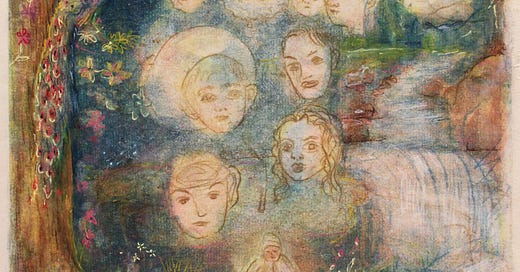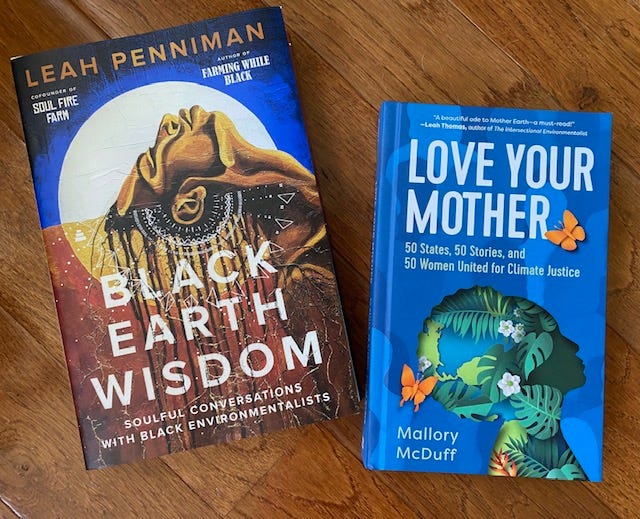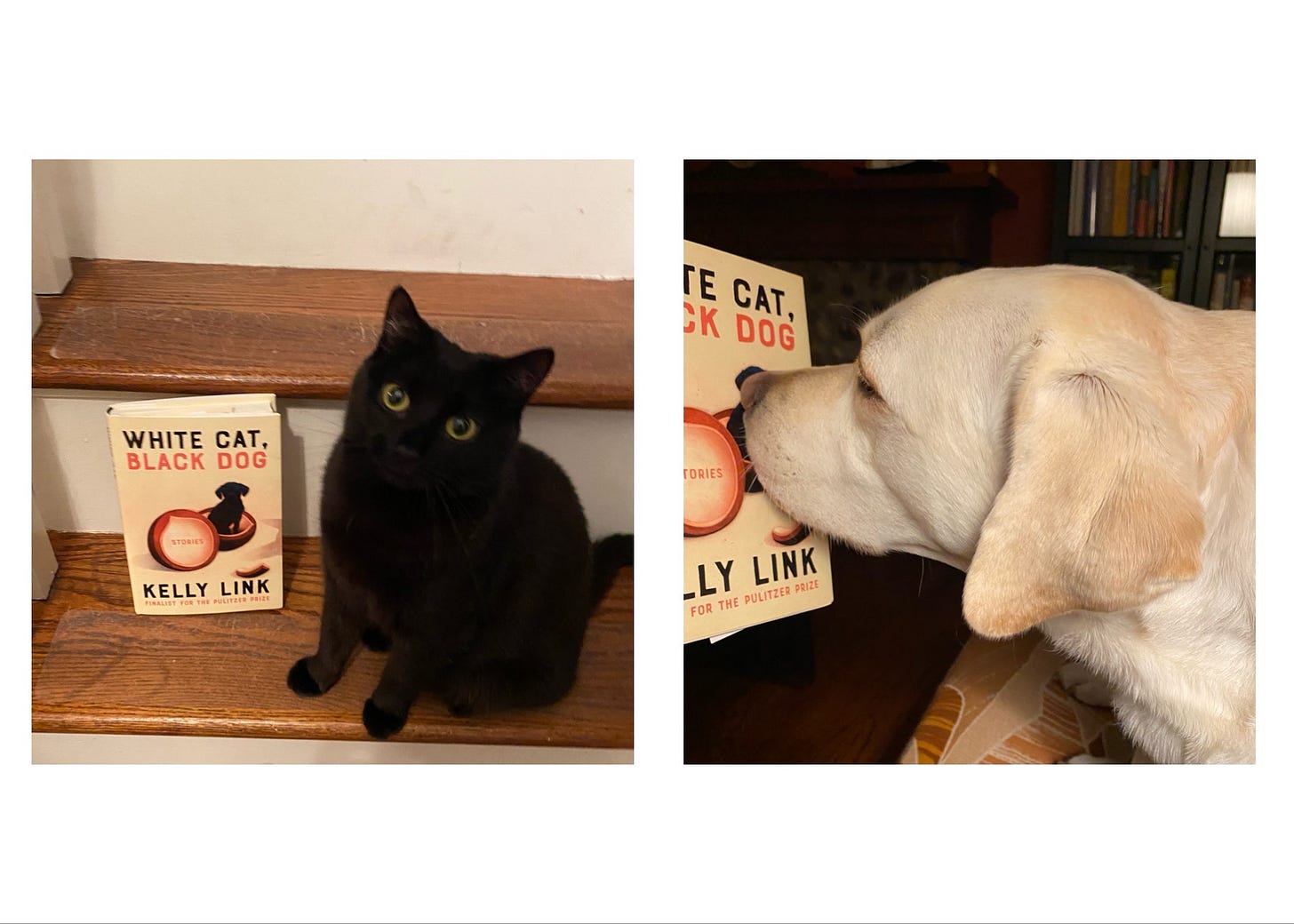Hello friends,
I somehow missed sending my April newsletter. This one will be a little shorter than the last, but I wanted to say hi—and also welcome to new subscribers.
Many of you landed here by way of the brilliant Sebene Selassie, a friend, writer, and teacher whose Cosmic Connection newsletter I adore, whose Groove is in the Heart weekend at Omega Institute is the North Star of my summer plans, and who honored me by taking my Writing About Ancestor Trouble class earlier this year and describing it as “incredible” (!), and recommending (on faith) my upcoming one-day class, Family History With Imagination, which will be held June 18. (Updated to say: this class is now closed. Thanks so much for all the interest!)
You can register at Maud’s Place (it will be necessary to create an account on the network and then go into the class space there to sign up) or find more info in my last newsletter. Enrollment will be open for a few more weeks.
In other news, I’m told my review of a book I really admire will be out around the book’s pub date, which is soon. Sorry to be cagey, but them’s the rules! More on that to come. I’m also working on my novel draft, tinkering with some possible essays, and coming up with plans for upcoming classes and other offerings. There’s been other stuff going on, some of it difficult, so I’m keeping this dispatch short and linky.
Of note:
Ava Chin’s A Chinese American Family's Story of Exclusion and Homecoming is officially out. Longtime readers may recall that I read Mott Street in galleys and wrote a blurb attempting to evoke a whiff of my admiration. Here’s some praise from Megan Vered’s LA Review of Books piece that especially resonates for me: “Chin probes the plight of four generations of her ancestors with the tenacity of a historian, the fine brush of an accomplished artist, and the sensitivity of one who openly communicates with the dead.”
For PBS, Latria Graham reads her beautiful and wrenching 2020 Garden & Gun essay, “A Dream Uprooted,” on losing her family’s farm, and her connection to the land: “My grandmother’s house is the center of my pine tree galaxy. As a child, I spent every holiday in that place, surrounded by family, sharing food, and telling stories…. The acreage around it has been in my family’s possession for more than a hundred years. At a time when many other African Americans were still sharecroppers, we owned the place we called home, naming the streets after relatives, leaving our mark on the land.” The clip is from a longer Reel South episode. Graham also has new work in Black Earth Wisdom: Soulful Conversations With Black Environmentalists, edited by Farming While Black author Leah Penniman, and Love Your Mother: 50 States, 50 Stories, and 50 Women United for Climate Justice, edited by Mallory McDuff.
“Oldest-known DNA offers glimpse of a once-lush Arctic…. A region just 600 miles from the North Pole was once covered by a forest of poplar and birch trees [and] inhabited by mastodons… and Arctic hares.”
I’m in love with these prehistoric sewing needles.
I keep returning to Nanette Vonnegut’s art. Here’s a larger version of the “Family Tree” monoprint pictured at the top of this newsletter. And look at the faces in Bowl of Ghosts, which might appear at first glance to be a vase of flowers.
Direct ancestors of King Charles enslaved Black people in Virginia. “According to historical documents unearthed by researcher Desirée Baptiste, whose investigation into the Church of England’s links to the slave trade is the subject of her play Incidents in the Life of an Anglican Slave, Written By Herself, King Charles is the direct descendent of Edward Porteus, a 17th century tobacco plantation owner in Virginia who in 1686 received a shipment of at least 200 enslaved people from the Royal African Company.”
Descendants of Robert E. Lee and the Black people he enslaved gather in person at Arlington House, the national monument to Lee (gah) in Virginia.
California’s Reparations Task Force “approved recommendations on Saturday that could mean hundreds of billions of dollars in payments to Black residents to address past injustices. The proposals to state legislators are the nation’s most sweeping effort to devise a program of reparations..”
“Museums around the nation have held items and ancestors from Northwest Indigenous communities for decades.” On the effort to bring them home.
In related news from the East Coast, the Lenape people (whose land I reside on in Queens) ask the Mennonites of Pennsylvania for land to bury their people whose remains have been returned by museums and universities under the Native American Graves and Protection and Repatriation Act of 1990.
“Walking the Trail of Tears, DeLanna Studi retraces her ancestors' steps in ‘And So We Walked.’”
“I tried to contact my Jewish ancestor through an Ashkenazi seance.”
“Most conversations about Palestine are centered around what is happening today on the ground, and people very rarely look back to 1948 when hundreds of thousands of Palestinians, like my grandparents, were forced to leave their ancestral homes. I wanted to make this documentary because I believe these stories need to be told. To understand where we are now, we need to look to that turbulent time, and the human impact on families whose lives were changed forever.”
“One of the elders proposed the creation of a Colombian museum and cultural center called Casa-Museo, or La casa de los ancestros que queremos ser (‘the house of the ancestors we want to become’). It will be built as a replica of the universe, with rounded walls, woven palms, and four posts to signify the four cardinal directions, each one connecting the earth with the sun.” See also.
An advance copy in my reading pile that I’m eager to get to: They Called Us Exceptional: And Other Lies That Raised Us, by Prachi Gupta, on freeing herself from the “model minority” myth and grappling with the harm it has done to her Indian American family. “In examining with boundless love the secrets and sorrows of one family, Gupta shows us the life-altering power of telling one's truth.”—Megha Majumdar, author of A Burning. (Out in August.)
And finally, I am savoring Kelly Link’s White Cat, Black Dog (which you could order from her bookstore, Book Moon). As you can see, Ida and Daisy have just a couple of small notes.







Thanks, in particular, for the link to the Lenape request to bury their ancestors on land now held by the Mennonites. Some of my ancestors were Pennsylvania Mennonites and I wonder if writing in support of the Lenape request would be of any help.